Why Won't My AC Cool Upstairs?
This question has the simplest answer possible: thermodynamics. Scary word for a simple concept. Heat rises. That fact, coupled with home HVAC systems commonly featuring the thermostat on the main floor, means that your HVAC is controlling the environment on your main floor. That is the reason your AC won’t cool upstairs.
Once that thermostat detects that the main floor is at the set temperature, the entire system will shut off, regardless of the temperature on the top floor.
The floors above are subject to the heat that has been displaced from the main floor. In most home HVAC systems this problem gets compounded because the upper floors usually have much longer duct runs, which means less airflow from the HVAC system There’s not much else to it than that, as far as the cause of the problem.
How Can I Cool My Upstairs?
There are a handful of ways to cool your upstairs. There are a few quick “band-aid” solutions and some long-term investments that could actually resolve the issue altogether.
Quick Solutions for Cooling Your Upstairs
These are quick fixes designed to be more of a stopgap. They might alleviate some of the heat that gets stuck in your upstairs, but don’t actually solve the problem of your AC not cooling your upper floors.
Adding an Air Scoop
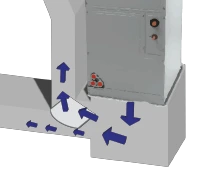
You could add an air scoop to your ductwork. What this does is more air from your main floor to your upper floor. So as your HVAC is pumping in cool air to your downstairs living space, it’s also pumping more air into your upstairs.
This would cause more even cooling but at the expense of efficiency as it will siphon off air to the upstairs. This could cause an increase in the time it would take to cool the main floor.
Adding A Manual Damper
This is a gate to restrict airflow. This could be turned one way to prevent airflow to the upstairs in the summer. The goal of this is to limit the amount of hot air that naturally rises. It could then be turned the other way in the winter to allow that heat to rise.
This could be combined with an air scoop so that the only air traveling to the upper floor through the ductwork is coming from your AC.
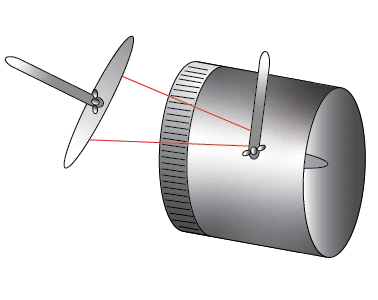
What Are The Best Ways To Cool Upstairs Rooms?
There are some more long-term solutions to cool your upstairs that you might want to consider. Some are definitely more of a financial investment than others, and some may not even be practical for all homes. Not every HVAC system is the same because not every home is the same.
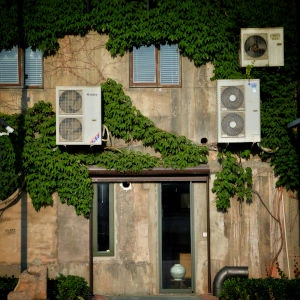
Have Two HVAC Systems
The idea is to have one system that images your main floor and one that manages your upper floor. This might seem like overkill, and for most homes, it probably is. Only a few homes could even handle having two HVAC systems running at the same because of the amount of infrastructure required. This is also the most expensive option.
You would have to pay the upfront cost of installing two different HVAC systems. Then you would have to maintain and upkeep those systems and pay for the energy they consume.
Use Zoning
This solution achieves what having two HVAC systems would do, but with fewer moving parts.
A thermostat could be placed on your main floor and your upper floor. The system would recognize these as two different zones. Automatic dampers would be placed in the ducts and connected to the sensors. The HVAC system could then direct airflow to both floors, or just one floor.
This solution has the requirement that your HVAC System can support zoning. An example would be a Smart System. If you want more info on these kinds of HVAC systems, we talked about them in How Much Does An HVAC System Cost.
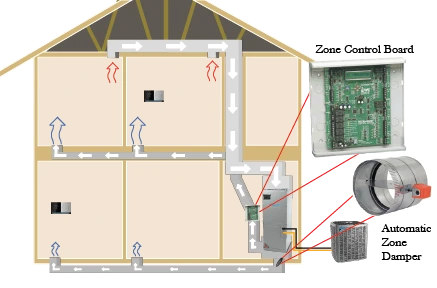
In short, the ductwork and the airflow of a furnace are calculated to meet a certain load. If you half that load, by only sending air to one floor, the math is off and the furnace sends and pulls so much air at the same time it becomes a problem. A smart system works within the zones to calculate how much it needs to reduce airflow to keep the system running efficiently.
Use A Ductless System
A solution that is ideal for a small room or an open concept room is adding a small ductless system.
A mini ductless system split from your main HVAC system would work at managing a small space
On the upper floor to keep it cool and protected from rising heat.
However, if you have multiple bedrooms and other areas on your upper floor, this system could not cover that much space efficiently.
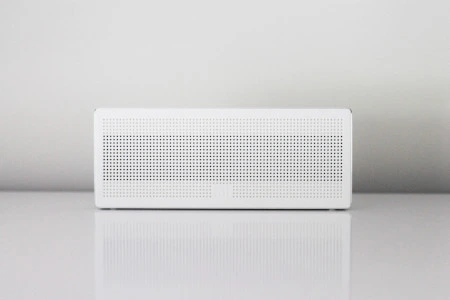
Who Are Advantage Heating & Air Conditioning, LLC?
We are your local HVAC Experts out of Salem, Oregon. We hope this article gave you some insight why your AC won’t cool your upper floor, as well as some ideas how you could manage your upstairs environment. If you have questions about HVAC Systems, please check out our other blogs. If you want to know who we are and how we can help, please visit our website and follow us on social media. We’ll be here when you need us.







